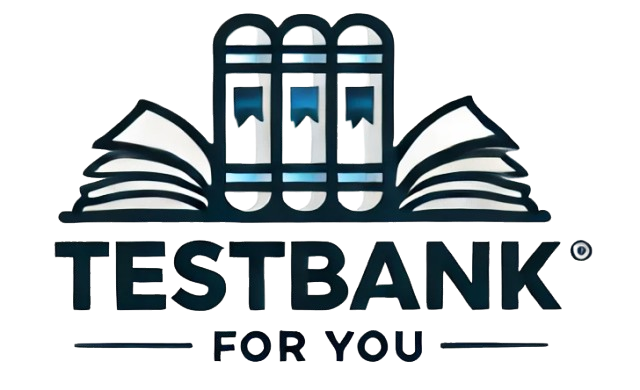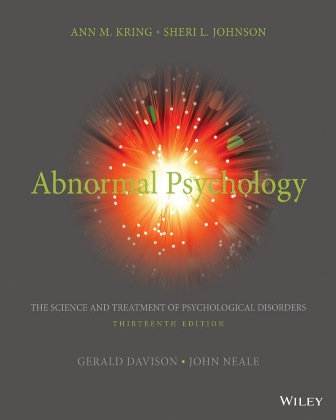Abnormal Psychology 13th Edition by Kring Solution Manual
Original price was: $60.00.$30.00Current price is: $30.00.
Solution Manual for Abnormal Psychology, 13th Edition, Ann M. Kring, Sheri L. Johnson, Gerald C. Davison, John M. Neale, ISBN: 1118953983, ISBN: 9781119031352, ISBN: 9781118953983 To get more information about this please send us E-mail to smtb7000@gmail.com
Description
Solution Manual for Abnormal Psychology, 13th Edition
Authors: Ann M. Kring, Sheri L. Johnson, Gerald C. Davison, John M. Neale
ISBNs: 1118953983 | 9781119031352 | 9781118953983
The Solution Manual for Abnormal Psychology, 13th Edition is a comprehensive academic resource that supports students and instructors in fully understanding the complex subject of psychopathology. Designed to accompany the core textbook by Kring, Johnson, Davison, and Neale, this manual provides detailed solutions, explanations, and guidance for every chapter, offering a deeper understanding of psychological disorders, diagnostic methods, and treatment models.
This solution manual is ideal for undergraduate and graduate psychology students, educators preparing lesson plans, or anyone needing well-explained answers to textbook questions. It clarifies difficult concepts, reinforces key learning objectives, and supports exam preparation and clinical thinking.
Below is an overview of the chapters and topics covered in the solution manual:
Chapter 1: Introduction and Historical Overview
Provides comprehensive answers to questions on the historical development of abnormal psychology, definitions of mental illness, and major historical figures in the field.
Chapter 2: Current Paradigms in Psychopathology
Covers cognitive-behavioral, biological, psychoanalytic, and integrative approaches to understanding mental disorders. Solutions explain how each model contributes to diagnosis and treatment planning.
Chapter 3: Diagnosis and Assessment
Includes detailed explanations of diagnostic criteria, reliability and validity of assessments, clinical interviews, and the DSM-5 classification system.
Chapter 4: Research Methods in Psychopathology
Explains research designs including experimental, correlational, and longitudinal studies. Solutions focus on interpreting data and understanding ethical considerations in mental health research.
Chapter 5: Mood Disorders
Covers major depressive disorder, persistent depressive disorder (dysthymia), and bipolar disorders. Solutions explain symptom profiles, biological bases, and therapeutic approaches.
Chapter 6: Anxiety Disorders
Includes generalized anxiety disorder, panic disorder, phobias, and social anxiety disorder. Answers help clarify the differences between disorders and outline treatment options such as CBT and medication.
Chapter 7: Obsessive-Compulsive Related and Trauma-Related Disorders
Explores OCD, PTSD, and related conditions. Solutions focus on identifying symptoms, theoretical causes, and intervention strategies.
Chapter 8: Dissociative and Somatic Symptom Disorders
Explains disorders like dissociative identity disorder and illness anxiety disorder. Solutions discuss diagnostic complexity and treatment challenges.
Chapter 9: Schizophrenia
Provides thorough explanations on symptom clusters (positive, negative, cognitive), causes, and treatments including antipsychotics and psychosocial interventions.
Chapter 10: Substance Use Disorders
Focuses on alcohol, drugs, addiction models, and recovery options. Solutions cover physiological effects, social consequences, and relapse prevention.
Chapter 11: Eating Disorders
Addresses anorexia nervosa, bulimia nervosa, and binge-eating disorder. Detailed answers explore psychological, cultural, and biological contributing factors.
Chapter 12: Sexual Disorders
Covers sexual dysfunctions, paraphilic disorders, and gender dysphoria, offering solutions grounded in clinical evidence and current DSM-5 definitions.
Chapter 13: Disorders of Childhood
Includes ADHD, autism spectrum disorder, and conduct disorders. Solutions explain developmental aspects, risk factors, and interventions.
Chapter 14: Late Life and Neurocognitive Disorders
Focuses on Alzheimer’s disease, dementia, and late-life depression. Answers emphasize diagnosis, caregiver support, and age-related changes.
Chapter 15: Personality and Personality Disorders
Explains personality structures and disorders such as borderline, antisocial, and narcissistic personality disorder. Solutions discuss trait theory and treatment barriers.
Chapter 16: Legal and Ethical Issues
Covers competency, insanity defense, patient rights, and ethical challenges in mental health practice. Solutions include case study explanations and legal definitions.
This Abnormal Psychology 13th Edition Solution Manual is a crucial resource for reinforcing textbook knowledge, preparing for exams, and understanding the practical application of psychological theories in clinical settings.
https://testbankforyou.com/shop/









